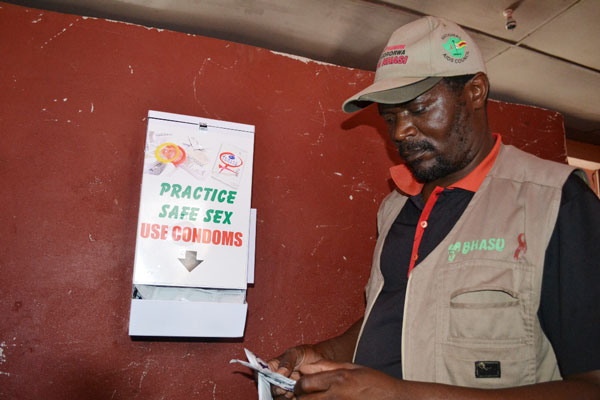
It’s 10am and loud music from Baba Harare’s song The Reason Why is booming outside a grocery shop. And not to be outdone, an old hi-fi at an adjacent barbershop is reverberating to some Zimdancehall music. It’s music everywhere at Mupandawana growth point in Gutu.
social commentary with Moses Mugugunyeki

Mupandawana is among several of rural service centres that benefited from the government-initiated growth point policy of 1981 which was meant to redress the unbalanced nature of the colonial economy.
In 1985, through the Public Sector Investment Programme, each growth point, including Mupandawana, received a minimum of Z$160 000 for infrastructural development, which saw the establishment of bus termini and market stalls, as well as rural council offices, among others.
For the past three decades, there was meaningful development as major retailers, banks and other businesses made a beeline to the rural service centre, 90km north-east of Masvingo town.
As a result of booming business, the growth point attracted sex workers from all over the district and there was a ready market ranging from workers at the shops, banks, government departments and army personnel based at the nearby 42 Infantry Battalion Barracks.
Without any industry to talk about, save for the Grain Marketing Board depot which receives seasonal supplies of grain and agricultural inputs, Mupandawana transformed from a mere rural service centre into a prime business centre.
“When Mupandawana was awarded growth point status shortly after independence, no one thought it would develop into a town like what it is today,” said 49-year-old Clifford Gumbo from Gutsa village in Chief Chitsa’s area, who operates a grocery shop at the centre.
- Chamisa under fire over US$120K donation
- Mavhunga puts DeMbare into Chibuku quarterfinals
- Pension funds bet on Cabora Bassa oilfields
- Councils defy govt fire tender directive
Keep Reading
While the growth of Mupandawana was seen as shifting investment concentration from urban areas, as well as reducing rural-urban migration, Gumbo believes little was done to uplift the lives of people, compelling most people to find other alternative sources of income.
“The idea of transforming Mupandawana into a growth point and later into a town was noble, but the government did not avail sustainable programmes for the locals. This has resulted in people here doing all sorts of things, including sex work, to eke out a living,” Gumbo said.
“It’s not a secret that Mupandawana is synonymous with sex work. If you would have stayed here up to late hours, you would understand what I am talking about. Many of our sisters have joined the oldest profession to make ends meet and we have others who have flocked from other places.”
Gumbo said HIV and Aid has bored through the heart of the town.
“Before the advent of Aids service organisations and antiretroviral treatment, many people succumbed to Aids,” he said.
National Aids Council (NAC) provincial manager for Masvingo Edgar Muzulu confirmed that Mupandawana was among HIV hotspots in the province.
“Our HIV hotspots in the province include Ngundu, Chibi turn-off, Chiredzi, Mhandamabwe, Chibi business centre, Nyika growth point and Mupandawana town,” he said.
A hotspot is a geographical area or location with evidence of high prevalence of HIV, sexually transmitted infections (STIs) or behaviours that put people at the risk of acquiring HIV infection.
HIV prevalence in Masvingo province is around 12,8%.
“We have recorded high cases of STIs in Masvingo [Masvingo provincial hospital], Nyika Clinic [Bikita], Gutu [Mupandawana], Hippo Valley and Ngundu,” Muzulu said.
Seeing that their colleagues were succumbing to HIV and STIs, sex workers at Mupandawana are mobilising themselves to seek health services.
“We are mobilising ourselves under the banner Micro Planning Activities where we are working in partnership with NAC and the Health ministry,” said a sex worker who preferred to be called Sisi Gire.
“I am the peer educator supervisor and my task is to ensure that the ‘Sisters with Voice’ are getting the health services like STI and HIV screening at Gutu District Hospital where we also access the services.”
Sisi Gire said part of her duties are to go door-to-door mobilising her colleagues to go for HIV testing and counselling as well as access cancer screening services.
NAC district coordinator for Gutu Pascal Mukuwe said the idea behind the Micro Planning Activities was to reach out to the sex workers who most are difficult to reach during the day.
“Sex workers are classified as a key population; hence NAC has come up with STI and condom sensitisation/awareness campaigns. We conduct dialogues on HIV prevention strategies with sex workers and we also conduct training of peer educators for sex workers and condom distribution,” he said.
“The idea behind the micro-planning activities is to reach out to the sex workers, who are one of the most delicate groups of our society. They will be at ‘work’ during the night and during the day they are sleeping, making it difficult for them to be reached by HIV and Aids intervention programmes which in most cases are conducted during the day.”
Mukuwe said the sex workers at Mupandawana were working in partnership with the Health ministry which allocated two nurses to deal with the sex workers. “The sex workers go to the hospital twice a week (Tuesday and Friday) where they get services,” he said.
As part of the STI and condom sensitisation campaigns, NAC has put condom dispensaries in some liquor outlets at the town.
However, Gumbo believes the only panacea to sex work at Mupandawana was for the government to fund small-to-medium enterprises, as well as other infrastructural developments at the growth point.
“People, especially females, resort to sex work because of poverty. If these people get self-sustainable projects, most of them would not be roaming around bars at night,” he said.











